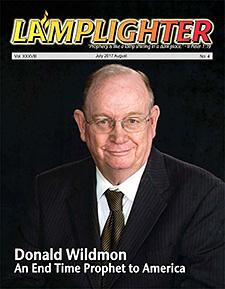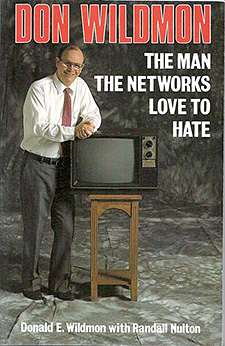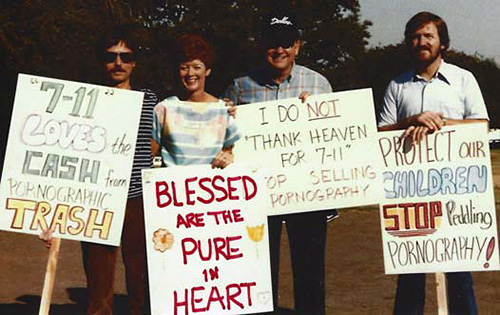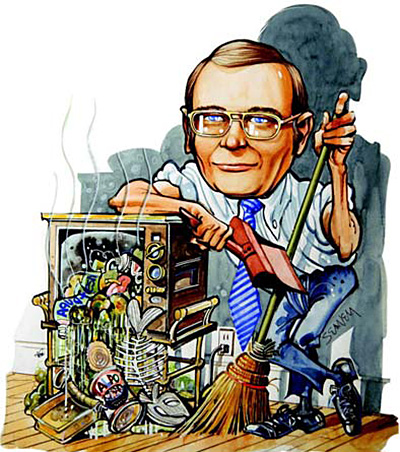Donald Wildmon
A Voice Crying for Decency

Let us behave properly as in the day, not in
carousing and drunkenness, not in sexual
promiscuity and sensuality, not in strife and
jealousy. But put on the Lord Jesus Christ, and
make no provision for the flesh in regard to its
lusts. — Romans 13:13–14
I first became aware of Donald Wildmon’s ministry — the National Federation for Decency — in 1985 when he decided to confront the huge American company called the Southland Corporation. It was the home base of more than 7,500 7–Eleven convenience stores, and Donald Wildmon became incensed when he discovered that it was the nation’s largest retailer of pornographic magazines like Playboy and Penthouse.1
A Plea for Decency
The official sales slogan of the company at that time was, “O Thank Heaven for 7–Eleven.” Wildmon thought it was ludicrous that a company with that slogan would be the number one peddler of porn. So, in 1983 he launched a public relations campaign to put pressure on the company in an effort to get them to stop selling the magazines.
The pressure continued throughout the year, and the Southland Corporation responded with silence, totally ignoring Wildmon’s pleas. But a victory did occur in April of 1984 when Jack Eckerd, the founder of Eckerd Drug Stores, announced he was taking the magazines out of his 1,000 outlets.2
Picketing for Decency
Still, there was only silence from the Southland officials. So, in August of 1984, Wildmon called for people to form picket lines in front of 7–Eleven stores, and they did so in 168 cities. (Keep in mind this was long before you could rally people by way of the Internet.) In October, the picketing occurred again, this time at 600 stores across the nation.3
Southland continued to stonewall the movement — despite the fact that by the end of 1984, thousands of stores had ceased to sell the magazines (600 Super X drug stores, 400 Super America gas stations, 450 Albertsons food stores and hundreds of independently owned, franchised 7– Elevens).4

A March for Decency
Finally, Wildmon called for a “March Against Pornography” aimed at Southland’s corporate headquarters in Dallas, Texas. It was scheduled for Labor Day, 1985. Some 13,000 concerned citizens turned out.5 This was when I first became aware of Donald Wildmon and his ministry. My staff and I participated in that rally. We were dubbed, “evangelical terrorists” and “literary death squads” by Hugh Hefner, the publisher of Playboy.6
In April of 1986, the Southland Corporation finally capitulated and withdrew the magazines from their 4,500 corporately owned stores. This produced a chain reaction, as 5,000 more stores pulled the magazines in the following weeks, including 2,000 Revco drug stores and 1,400 Rite Aid “family” drug stores.7 During the ensuing months, Playboy’s circulation dropped over 650,000 copies per month.8

The Man Standing for Decency
Who was this powerhouse called Don Wildmon? He had already brought Sears to its knees because his monitoring of television programs had revealed that Sears was one of the leading sponsors of trash TV — programs containing the most sex, violence and profanity. It was against this massive corporation that he launched his very first boycott in 1978. And it had been successful.9 He was to become known as “the man the networks love to hate”10 and “the preacher who causes heartburn in Hollywood.”11
It seemed that a man with such enormous influence had to be a mega–church pastor or a well–known television personality. But no, before he established the National Federation for Decency in 1977, he had served for eight years as the pastor of a small United Methodist Church in Tupelo, Mississippi. During those years, it had grown from “a handful of people” to only 75 members. As Wildmon later put it, “I didn’t exactly set the world on fire in those eight years.”12
In 1976 Wildmon was moved by his bishop to a church in Southaven, Mississippi, a suburb of Memphis, Tennessee. At that point, he felt burned out. He had been an ordained minister for 20 years. He was “bored and felt constrained.” He had “lost the feeling God had something ‘special’ for me to do.” Putting it more graphically, he said he “felt like a monkey in a cage, going round and round and getting nowhere.”13
So Wildmon had no sterling record of accomplishment when God called him. But the Bible makes it clear that when God looks for a servant to anoint, outward appearances are unimportant to Him. His concern is the heart, as explained in 2 Chronicles 16:9 — “For the eyes of the LORD move to and fro throughout the earth that He may strongly support those whose heart is completely His…”
Don Wildmon was such a person. He was completely sold out to the Lord, and God had a plan for him that was beyond anything he could imagine.
The Challenge of Decency
It all began on a December evening in 1976. His children wanted to watch TV, and when they took a look at what the three main networks had to offer, they could not find anything decent. The first program was sexually inappropriate, the second was full of foul language, and the third featured a man being beaten to death with a hammer!14
That night, after he went to bed, Don began thinking about how he could get the attention of the networks in order to impress upon them the need for wholesome programming. That’s when he got an idea that would prove to be revolutionary — he would call on Christians to turn off their TV sets for a week. The next day, he drew up a press release and sent it out to all the media in Memphis. To his total shock, the Associated Press picked up his proposal, and before he could grasp what had happened, he started receiving inquiries from all across the nation.
He was 39 years old. He had no money. He had no connections with the powerful. But far more important, he had been anointed by God to take a stand for righteousness.
The “Turn the Television Off Week” was held during the week of July 24–30, 1977.15 As soon as it was over, Wildmon resigned his pastorate, moved back to Tupelo and established his new ministry which he initially called The National Federation for Decency (the name was changed to the American Family Association in 1988). As he later put it, “I had a vision; God had a plan.”16
A year later in 1978 his volunteers, who were monitoring television programming on the major networks, made a surprising discovery — that Sears was one of the major advertisers on programs Wildmon considered to be morally unacceptable. This led to a major crusade against Sears, and the corporation responded positively by cutting its sponsorship of the programs.17
This spectacular success propelled Wildmon into the focus of the secular, hostile media. It also led to many important speaking invitations.
The Crusader Becomes a Prophet
When Wildmon first started his ministry, his only goal was to fight profanity, sex and violence on TV. But as the years passed, he realized that he was in a battle for Western Civilization and that God had called him to speak out in behalf of basic Christian values wherever they might be attacked. His response was to broaden his scope from simply a focus on television to a defense of America’s Judeo-Christian consensus wherever it was assaulted by the aggressive forces of Humanism.
This broadened scope was revealed in a very important speech that he was invited to deliver to the prestigious and influential Los Angeles World Affairs Council in April of 1982. In this speech, Wildmon began speaking as a prophet, pointing to the sins of our nation and warning of their consequences.
Although his audience was a thoroughly secular one, Wildmon began by quoting Scripture:18
Years ago a simple Jewish tentmaker spoke these words, “Whatsoever a man sows, that will he also reap.” That truth is as valid for a nation as it is for an individual. The truth of the words of Paul of Tarsus is evident in our country today. For more than a generation now our society has been sowing seeds which are today bringing forth their fruit. Truth can be rejected, but it cannot be avoided.
He launched into a brief review of the religious heritage of our nation, arguing that “underneath the heart of America there was always abiding a strong belief in the guiding hand of a Divine Being.”19 He then asserted, “Today, belief appears to be slowly dying, pushed aside by those whose religion is self–interest and self–indulgence.”20
He pointed out that an “anti–religious attitude” had arisen in the nation that “no one would have dared to predict a generation ago.”21 He continued:22
So strong is this anti–religious attitude that in today’s atmosphere it would be impossible for Congress to make Christmas a legal holiday; to place “In God We Trust” on our coins; to include in the Pledge of Allegiance to the flag the phrase “One nation under God;” to have a chaplain open the sessions of Congress with a prayer or even to allow our armed forces to have chaplains.
At this point, Wildmon zeroed in on the fundamental problem:23
Atheism and agnosticism, with their stepchildren of humanism, hedonism, and materialism, may not be the official religions of our country, but they have become the accepted practical religion by many in key positions of influence.
He continued with the observation that “any religion or philosophy which teaches us to use people and love things is a natural enemy of the Christian faith, which teaches us to love people and use things.”24
Wildmon explained that in his opinion, “the greatest threat to the existence of our society” is “mind pollution,” and the greatest instrument of such pollution is television.25
He asserted that his ideas were “dangerous” and have been for two thousand years. He explained that they are the ideas that resulted in Jesus being nailed to a cross and the Roman Empire killing those who held such ideas. He then presented his audience with a list of the “dangerous ideas” he was talking about:26
- Sex is a beautiful gift given by God to be shared between husband and wife.
- Violence is not God’s way of resolving conflict.
- The elderly are an important part of society to be honored and respected for their wisdom and experience.
- Intelligent and thoughtful people can express themselves without resorting to vulgar, crude and filthy language.
- Religion is a vital part of life.
He brought this powerful and insightful presentation to a close by speaking of the inevitable consequences of abandoning our Judeo–Christian heritage:27
What is at stake is whether we will remain a country accepting the Judeo–Christian concept of right and wrong, or turn our back on centuries of progress to embrace practical atheism…
We can have a society that recognizes God and His moral standards, or we can have a society that recognizes the “make–it–up–as–you–go moral standards of Hollywood.” We cannot, however, have both as equals.

(Supplied by the
American Family Association)
He then concluded as he began, reminding his audience that “a nation which turns its back on God and His moral standards will reap what it sows… We are beginning to learn the party is over. It is time to pay the fiddler.”28
The Response
Needless to say, Wildmon’s comments were not well received. But that should be no surprise. Prophets are never well received — not even by believers. People have always desired “pillow prophets” who would deliver soothing words. They have despised true prophets who expose their sins and call them to repentance.
Wildmon has been viciously attacked throughout his career:
- An NBC executive branded his ministry boycotts as “the first step toward a police state.”29
- A CBS vice president called his efforts “the greatest frontal assault on intellectual freedom this country has ever faced.”30
- An executive with Warner Brothers studios called him a “Crypto Snake Handler.”31
- Playboy magazine dubbed him “A Religious Dingbat.”32
- The president of CBS called him “The Ayatollah of the Religious Right.”33
- The chairman of Rite Aid drug stores characterized him as a “Rabble Rouser.”34
- The Southern Poverty Law Center designated his ministry as a “hate group.”35
He has been most commonly written off as a “redneck, country preacher.”36 This characterization was in response to his Southern, small town heritage and accent. But this ignores the fact that he is a man who is well educated, having earned a Bachelor’s degree from Millsaps College and a Master’s degree from Emory University’s Chandler School of Theology.37
A Personal Experience
I have first hand knowledge of how Wildmon has been viewed by his opponents. In 1987 he launched a protest movement against Holiday Inn because they started supplying porno movies to their rooms. I joined the protest by writing to the company to express my dismay with their new policy.
Normally, corporations respond to such messages with a carefully crafted public relations letter that is designed to put the company in the best possible light. But to my surprise, I received a personal letter from one of Holiday Inn’s vice presidents, and he unloaded on me in a very emotional manner.
He said I “obviously” was one of Don Wildmon’s supporters. He wondered how a person like me, “with Dr. in front of his name,” could be a supporter of a “country bumpkin” like Wildmon. He concluded his letter by saying that he and all his colleagues just could not figure out how a “hick–from–the–sticks” like Wildmon could garner so much support.
I wrote back and explained it was all due to a person called the Holy Spirit.
The Worst Critics
Secular critics were not the ones that bothered Wildmon the most. Rather, what really disturbed him were the critical messages he received from pastors. He told me personally about this one time, but he also wrote rather frequently about it in his opinion column that appeared in each issue of the AFA Journal.
Wildmon experienced disappointment with pastors from the very beginning. When he first came up with the idea of turning off TV for a week, he thought it would be easy to get thousands involved by appealing to pastors to rally their congregations. But his appeals, even within his own denomination, were met with stony silence. This prompted him to start talking about 300,000 silent pulpits in America:38
Today, 4,000 innocent precious lives of unborn babies were snuffed out… And 300,000 pulpits are silent… The networks make a mockery of Christians, the Christian faith and Christian values with nearly every show they air. Greed, materialism, violence, sexual immorality are standard fare. Program after program, movie after movie contains anti–Christian episodes and plots. News articles condescendingly refer to the “fundamentalists, right–wing Christians.” Those who speak out for the sacredness of life are branded as extremists. And 300,000 pulpits are silent.
What important matters are being dealt with in our churches? The church bulletin says there will be a meeting to plan the church–wide supper. We are raising money for a new floor cover in the kitchen. (The old one doesn’t match the new stove and refrigerator — we must deal with important things first.) The sermon subject last Sunday was “How To Have a Positive Attitude.” And best of all — we are organizing a softball team.
Needless to say, these negative portrayals of apathetic pastors did not endear Wildmon to them. As his exposure level continued to rise in the press, many pastors began to send him critical messages. A typical one would read: “You are just spinning your wheels. Things have gotten much worse since you started speaking out. You are not winning.” Wildmon’s response was one that I loved: “God didn’t call me to win. He called me to stand. We will not win until Jesus returns.”39
Regarding his secular critics and their characterization of him as a “country bumpkin,” Wildmon has responded by pointing out that the reason that image has been applied to him is “because that’s the way we [Christian leaders] are portrayed on television.”40 With regard to the condemnations he has received from secular spokesmen, Wildmon has said, “I praise God for it! I consider their condemnations to be a high honor. It means I’m doing my job right.”41
The Ministry Today
Today, the AFA Ministry operates on a budget of $20 million per year, with most of the donations averaging $20 per person. There are 400 local AFA affiliates, and the ministry has over 200 radio stations scattered throughout the nation.
They publish a monthly journal, they operate a news service, and they have recently started producing motion pictures. Over 180,000 subscribe to their journal, and they have 3.4 million subscribers to their email “Action Alerts.”42
Pretty impressive accomplishments for a “country bumpkin”!
In 2010 Don Wildmon was forced to retire due to illness. He suffers from St. Louis Encephalitis. His son, Tim, took over the helm of the ministry.
Honors
In March of 2017, Wildmon was honored by being inducted into the National Religious Broadcasters’ Hall of Fame. It is just one of many accolades he has received over the years.
One of his most significant awards was an honorary Doctor of Laws degree that was conferred on him by Asbury College in 1990. On that occasion, Dr. Dennis Kinlaw, the president of the college, made the following insightful remarks:43
In the course of human history, God has shown His grace to His children in many ways. One of those ways is in His gift of prophets…
Today God has looked with favor upon us and has given to our country again a prophet.
This one came… from Tupelo, Mississippi . . . [and in him] we have seen again the power of one single voice, evolved by God, to touch the conscience of a nation.
Needless to say, Don Wildmon’s outspokenness has not made him popular. His honesty and his convictions have brought him scorn, contumely, and open hostility…
The God of Scriptures is the God who does the unlikely. No one expected… a prophet of God out of Tupelo, Mississippi. But God has given us one. And today we at Asbury College give thanks.
Every time I think of Don Wildmon and his great ministry, I am reminded of the words of the Apostle Paul recorded in 1 Corinthians 1:27:
God has chosen the foolish things of the
world to shame the wise, and God has chosen
the weak things of the world to shame the
things which are strong…
References
1) Donald Wildmon and Randall Nulton, Don Wildmon: The Man the Networks Love to Hate (Wilmore, KY: Bristol Books, 1989) page 157.
2) Ibid., page 165.
3) Ibid., pages 165–166.
4) Ibid., page 168.
5) Ibid., pages 148–149.
6) Don Wildmon with Allen Wildmon, I Had A Vision; God Had A Plan (Tupelo, Mississippi: American Family Association, 2013), page 149.
7) Wildmon & Nulton, page 170.
8) Ibid., page 171.
9) Ibid., pages 43–55.
10) Ted Ownby, “Donald Wildmon, the American Family Association, and the Theology of Media Activism,” http://livedtheology.org/wp-content/uploads/2012/10/ownby_wildmon_paper4.pdf, undated, page 25.
11) Billy Dave and Steve Jordahl, “The preacher who caused heartburn in Hollywood,” https://www.onenewsnow.com, March 3, 2017, page 1.
12) Wildmon & Wildmon, page 12.
13) Ibid., page 14.
14) Wildmon & Nulton, pages 26–28.
15) Wildmon & Wildmon, page 59.
16) Ibid., page 14.
17) Wildmon & Nulton, pages 43–55.
18) Wildmon & Wildmon, pages 213–214.
19) Ibid., page 214.
20) Ibid.
21) Ibid., page 215.
22) Ibid.
23) Ibid.
24) Ibid., page 215.
25) Ibid.
26) Ibid., pages 221–223.
27) Ibid., pages 223–224.
28) Ibid., page 225.
29) Day & Jordahl, page 1.
30) Ibid.
31) Wildmon & Wildmon, page xii.
32) Ibid.
33) Ibid.
34) Ibid., page 149.
35) Wikipedia, “American Family Association,” https://en.wikipedia.org/wiki/American_Family_Association, page 1.
36) Dave & Jordahl, page 2.
37) Wikipedia, “Donald Wildmon,” https://en.wikipedia.org/wiki/Donald_Wildmon, page 1.
38) Family Research Council, “Prayer Targets: “Will the Church Forget?” http://www.frc.org/prayerteam/prayer-targets-will-the-church-forget-watchmen-on-the-wall-call2fall-boy-scouts, May 29, 2013, page 1.
39) Personal conversation with Don Wildmon in the 1980s.
40) Dave & Jordahl, page 2.
41) Ownby, page 25.
42) Anna Wolfe, “Inside the AFA: How One ‘Hate Group’ Is Fighting The ‘Gay Agenda,” pages 2–3.
43) Wildmon & Wildmon, pages 110–111.


